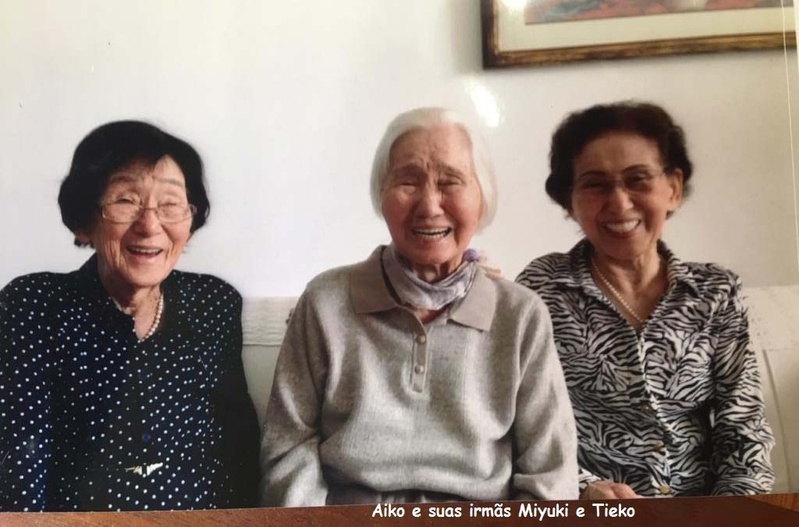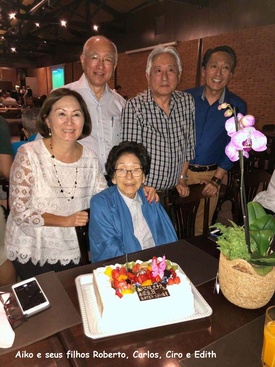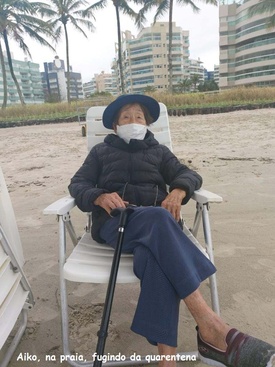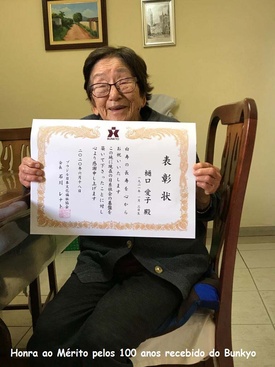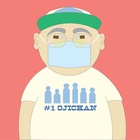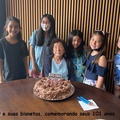Before the arrival of this terrible pandemic that is ravaging the world, Aiko, a retired housewife, living in the traditional neighborhood of Santana in the Capital of São Paulo, had a routine that was quite lively for a lady of her age. Known by her Brazilian neighbors as Dona Maria and Aitian or Aiko-san by her relatives, in addition to the usual walks she took in streets close to where she lives, she took tai chi chuan and brain gymnastics classes which, according to the teacher, were to improve concentration, reasoning and memory. The meeting, aimed at elderly people, took place weekly in a City Hall school, provided for this purpose. With his walking stick in tow, he walked there, covering several blocks, going up and down, a path that, in itself, was a real exercise even for the youngest. And it wasn't a problem for her, she did it with the greatest pleasure. Her arrival at school was an uproar, a source of applause and warm greetings from her friends. She was the oldest in the group, the “littlest” of the group.
Lately, Aiko has been having flashes of nostalgia for the time when, together with her husband Tetsuo, she practiced gateball on the Ibirapuera Park field. They went early, by subway, elegantly dressed in tracksuits and white sneakers, as if they were athletes. At that time, Aiko wasn't even using the cane. More than the game itself, it was meeting friends, all in the same age group, that pleased him most. The coffee break was the most awaited moment. At that time, along with the never-ending coffee and tea, there was always a delicious cake, manju and even sushi, which made the diners happy, earning them enthusiastic praise. It's a shame that these meetings no longer exist.
With the death of her husband and later of other members of the group, Aiko was displaced among the “young people” aged 60 to 70, who filled the gaps that emerged according to the natural law of life. As a result, Aiko felt out of place, without company. He became unmotivated and about ten years ago gave up for good! The memories of those very pleasant moments tend to provoke rare moments of melancholy in this creature of God, whose joy and optimism are greatest characteristics.
Aiko has been active and courageous her entire life! “I don’t like sitting still,” she says with conviction. Before the quarantine, I had a routine of going to the bakery where I would get fresh bread rolls every day. Every other day, before the sun came up and the children woke up, I would carry out this ritual, walking a couple of blocks to the establishment. But, before leaving, I would leave the table ready, with the coffee hot in the thermos. To be honest, it should be noted that Aiko's coffee has always been a separate chapter, highly praised. She learned how to make coffee with a percolator when, still young, but a mother of five children, she helped her husband, owner of a bar and ice cream shop in Tupã, a small town in the interior of SP. He was responsible for the snacks and coffee counter, which was always busy, thanks to his skill in preparing products and dealing with customers. Whether day or night, the clientele would hang out at the bar to enjoy the delicious sandwiches and coffees that Aiko's skilled hands prepared. And, to be honest, the parish was also attracted by the delicious and unparalleled natural ice creams that her husband Tetsuo prepared. It's easy to imagine why Aiko's pernula coffee and ham sandwich became famous and desired among family and friends to this day.
Aiko doesn't live alone. There is the permanent presence of Ciro and Edith who, single, ended up becoming indispensable company for their mother. Today, she no longer regrets the fact that they didn't get married and attributes it to fate: “God knows what he's doing!”
Even with the division of tasks, she is still in charge of the kitchen, preparing lunch and dinner each day, a task she does with mastery and ease, mixing Japanese and Brazilian cuisine. It's shiro gohan with beans and breaded steak, green salad and miso soup ! This, without neglecting your clothes, the sheets and towels that your fragile but experienced arms still take care of, at the same time that the plants, the flowering planter and the tree on the sidewalk in front of the house deserve your daily care. In addition to sweeping the sidewalk every morning. It is one of the few moments in which she manages to “get away” and stay outside the house for a while, which is still a cause for concern for her children, due to her affable and extroverted manner. She likes to talk to people! If you let him, he'll chat all morning!
But Aiko has a little secret that she only reveals to those closest to her: “I really like it when they take me out to lunch, in restaurants”, she says with a mischievous smile!
Another pleasure that she misses and misses are the trips and outings she took, thanks to the attention of three other married sons, Roberto, Carlos and Nilton, who work hard to provide this pleasure to their mother. She used to go to the beach regularly, visit places, farms and even spend a few days in country hotels, pleasures that made her very happy. As a justification, she said that, on the one hand, it was because it freed her from household chores, such as cooking and washing dishes, and, on the other, because it reminded her of when she was a girl and lived in a farm, in the countryside, where she had to help the children. fathers even in heavy work, such as on the farm. “Anyone who lived on a farm, walking on the ground, weeding and in contact with greenery, will never forget the smell of the forest”, she says with the wisdom of a matuta, reinforcing how attached she is to nature, to the simple life. And he adds: “I’m still very active! I go to the geriatric doctor regularly, my blood pressure is good, my heart, according to a doctor, belongs to a girl of about thirty years old”, he says with a loud laugh.
“But I don’t want to live that long, I’ve already lived enough! If God wants to take me, I'm ready. I think I've already accomplished my mission here! I have a wonderful family, I managed to get all my children to study to higher education, children who gave me beautiful and smart grandchildren and great-granddaughters! But, if God gave me the opportunity to still be on this earth, I want to be well, capable and without giving anyone trouble”, says Aiko, incredibly lucid in her almost 100 years of age, which she will turn next January. He has five children, 5 grandchildren and 5 great-granddaughters.
The advent of the pandemic imposed strict confinement on the elderly here in Brazil and Aiko, a centenarian, was not immune. She has been receiving all the attention and care from her family, who try to preserve her in the best possible way, avoiding external contacts and the approach of people who are not part of the family circle. As a result, he has been under strict quarantine since March this year, not leaving home and practically not receiving visitors, even from his closest relatives such as his married sons, daughters-in-law, grandchildren and great-granddaughters. As a consolation, the phone calls and WhatsApp messages are constant, but she complains that it's not the same thing. She misses her physical presence, especially her great-granddaughters, who tend to affectionately call her “Bisa”, great-grandmother, and shower her with kisses and hugs every time they visit her.
“I want to go out for a bit, go for a walk, even if it’s by car! If I don't die of illness, I'll die of boredom!”, she complains to her children, causing a feeling of guilt and heartache in all of them. It is clear that the extensive isolation has been causing symptoms of anxiety, which are increasingly difficult to control. However, the resilience and lucidity that Aiko has managed to maintain all this time is admirable.
Aiko Higuchi, born Aiko Mizobe, arrived in Brazil in 1927, together with her parents and brothers. He was only six years old. Of eight siblings, today she is the only survivor of the family of Ikuta and Koto Mizobe, originally from Yamaguchi Province.
The story of his life would serve as the plot of a high-drama film, such as the saga of hundreds of Japanese immigrants, who had to leave their homeland for Brazil, at the beginning of the 20th century. Her trajectory involved moments where pain, sadness, sacrifice, despair, joy and even revolt, mixed throughout an intense life, without ever making her lose confidence and hope for better days.
A painful fact that left a deep mark on his life was never being able to see his older brother, Naoyuki, the only one to stay in Japan because he was already in elementary school and his parents, at that time, thought it best to leave him there. in the care of his uncles. He was only 9 years old. Naoyuki never met his family again. Graduated and working in a large company, at the age of 25 he was victimized by the war, while providing military service on a vessel. Aiko regrets and cries to this day not being able to see her older brother again. According to her, Naotchan was handsome and smart!
And, in a way, still as a consequence of the 2nd. World War, the Mizobe family went through another tragedy, more painful and which occurred on Brazilian soil, in the historic city of Bastos, in the interior of SP. A city with a strong concentration of Japanese, it was the scene of a black page in the Japanese colony in Brazil at the time, when the terrorist organization Shindo Renmei, formed by Japanese citizens who did not recognize Japan's defeat in the 2nd. War, provoked attacks against members of Japanese society itself, in several cities in the interior. The first victim was Ikuta Mizobe, Aiko's father, who was only 21 years old at the time, married and with a 1-year-old son. Ikuta was director of the Bastos Agricultural Cooperative and as an enlightened and influential person, he was chosen to be murdered.
Aiko, outraged by this fact, harbored deep resentment for more than fifty years, until one day, unexpectedly, she received a visit from the granddaughter of the Japanese citizen who performed the crazy gesture. Humbly and ashamed, she asked for forgiveness for the act committed by her grandfather, which, according to her, she only became aware of as an adult, after becoming suspicious of some conversations she had heard from various sources and reading articles and reports about episodes that took place in the Japanese colony during the Second World War. World War. Only after this episode did Aiko feel a certain peace of mind, her heart torn apart at that time.
Aiko's detachment and courage were put to the test when she was around 60 years old and her younger brother Yoshiyuki (Yotiam) became seriously ill, requiring a kidney transplant in order to survive. She didn't think twice. He only obtained his children's approval and made himself available to the medical team. The surgery was successful and, since then, she has lived with just one kidney, which has never caused any problems.
To celebrate the centenary of his birthday, which would take place on 01/03/2021, the children had planned a big party, commensurate with the event, to which their closest relatives and friends would be invited, including those residing in the interior. Unfortunately, the pandemic emerged, making it impossible to celebrate on the scheduled date. Warned of the unforeseen event, she felt a certain disappointment, which was soon overcome by mentioning to her that an effective vaccine was about to arrive and with that, her birthday party could be held in due course.
As if it were compensation for the unforeseen event that had occurred, Aiko recently received two news that made her very proud: she was awarded the Diploma of Honor for Merit for One Hundred Years, awarded by Bunkyo – Brazilian Society of Japanese Culture and Social Assistance and also with o Certificate for the Celebration of One Hundred Years, offered by the Government of Japan, signed by former minister Shinzo Abe.
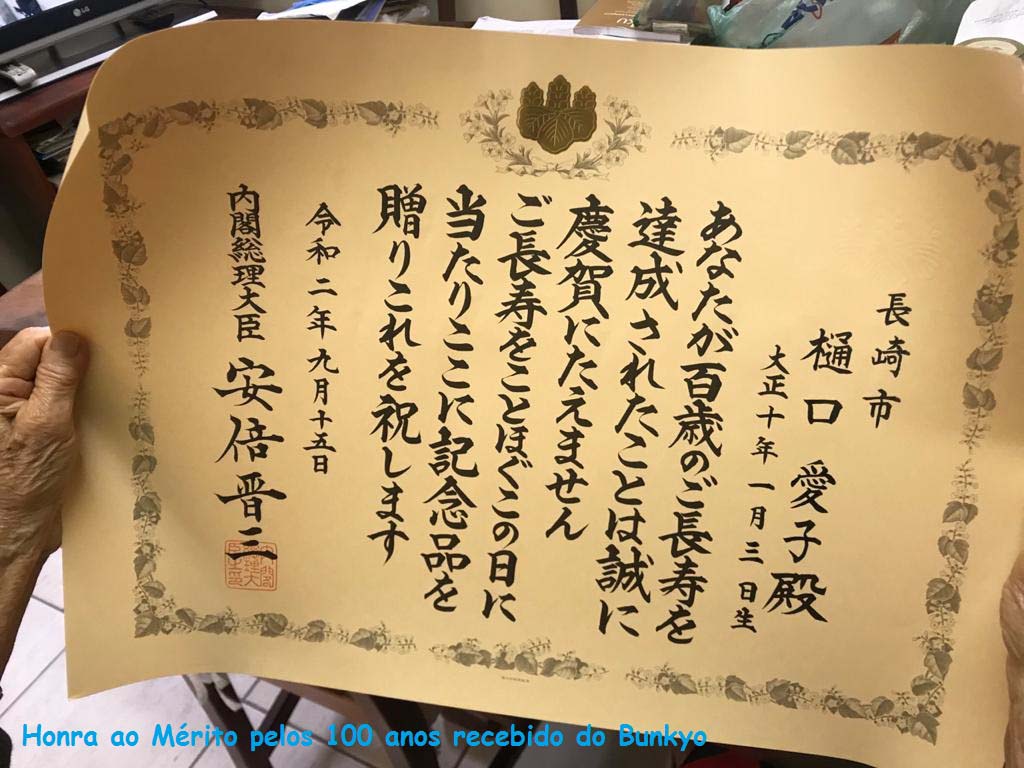
Mrs. Aiko, a little more patience! Strength! Gambatte kudasai!
© 2020 Katsuo Higuchi


